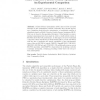Free Online Productivity Tools
i2Speak
i2Symbol
i2OCR
iTex2Img
iWeb2Print
iWeb2Shot
i2Type
iPdf2Split
iPdf2Merge
i2Bopomofo
i2Arabic
i2Style
i2Image
i2PDF
iLatex2Rtf
Sci2ools
116
click to vote
EMO
2009
Springer
2009
Springer
Multi-Objective Particle Swarm Optimizers: An Experimental Comparison
Particle Swarm Optimization (PSO) has received increased attention in the optimization research community since its first appearance. Regarding multi-objective optimization, a considerable number of algorithms based on Multi-Objective Particle Swarm Optimizers (MOPSOs) can be found in the specialized literature. Unfortunately, no experimental comparisons have been made in order to clarify which version of MOPSO shows the best performance. In this paper, we use a benchmark composed of three well-known problem families (ZDT, DTLZ, and WFG) with the aim of analyzing the search capabilities of six representative state-of-the-art MOPSOs, namely, NSPSO, SigmaMOPSO, OMOPSO, AMOPSO, MOPSOpd, and CLMOPSO. We additionally propose a new MOPSO algorithm, called SMPSO, characterized by including a velocity constraint mechanism, obtaining promising results where the rest perform inadequately. Key words: Particle Swarm Optimization, Multi-Objective Optimization, Comparative Study
Related Content
| Added | 24 Jul 2010 |
| Updated | 24 Jul 2010 |
| Type | Conference |
| Year | 2009 |
| Where | EMO |
| Authors | Juan José Durillo, José García-Nieto, Antonio J. Nebro, Carlos A. Coello Coello, Francisco Luna, Enrique Alba |
Comments (0)

